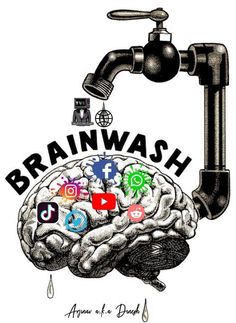Introduction

Imagine a world where political discourse transcends geographical boundaries. A world where citizens can engage directly with politicians and hold them accountable in real time. This is the promise of social media, a democratizing force that has revolutionized how we engage with politics. However, this very same power can be a double-edged sword.
The pervasiveness of social media platforms like Twitter and Facebook has irrevocably altered the landscape of political discourse. News and information, once filtered through traditional media gatekeepers, now flow freely online. Politicians can bypass traditional media channels and connect directly with voters, while citizens can easily organize and mobilize around political causes.
This undeniable influence demands critical examination. Social media offers a platform for amplifying marginalized voices and fostering a more inclusive political conversation. Yet, it can also be a breeding ground for misinformation, echo chambers, and political polarization.
What is Social Media?
Social media refers to web-based platforms that allow users to create and share content, connect with others, and participate in online communities. Core characteristics include:
- User-Generated Content: Social media platforms use users to create and share information, opinions, and experiences.
- Interconnectivity: Users can connect with friends, family, and like-minded individuals, fostering a sense of community.
- Real-time Communication: Social media enables instant communication and information sharing, blurring the lines between traditional media and audience participation.
- Accessibility: Social media is readily accessible through mobile devices, making it ubiquitous in our daily lives.
Thesis Statement:
This article will critically examine the influence of social media on political discourse. We will explore the historical rise of social media platforms, delve into their impact on political communication and engagement, and discuss the positive and negative consequences. We aim to foster a more informed and nuanced understanding of this complex relationship by analyzing real-world examples and considering potential solutions. Ultimately, we will explore how we can leverage the potential of social media while mitigating its negative aspects to create a healthier and more constructive political discourse.
The Rise of Social Media: A Platform Revolution

The story of social media's impact on political discourse begins not with the current giants but with the pioneering platforms that paved the way. Early social media sites like Six Degrees (1997) and Friendster (2002) laid the groundwork for online social connection. These platforms, though short-lived, introduced features like user profiles, friend lists, and essential communication tools that would become central to future social media.
The landscape shifted dramatically with the rise of dominant social networking sites like Facebook (2004), Twitter (2006), and YouTube (2005). These platforms offered a more dynamic and interactive experience. Facebook, focusing on connecting real-world friends and families, fostered a sense of community and online identity. With its concise message format (initially limited to 140 characters), Twitter revolutionized real-time communication and information sharing. With its user-generated video content, YouTube became a powerful platform for sharing political messages and mobilizing support.
The evolution of social media features further amplified its influence. News feeds, curated by algorithms based on user preferences, created personalized echo chambers where users are primarily exposed to information and viewpoints that reinforce their existing beliefs. User-generated content, like blog posts, comments, and videos, empowered individuals to bypass traditional media gatekeepers and disseminate information directly. The rise of live streaming further blurred the lines between traditional media and audience participation, allowing political events and rallies to be broadcast instantly to a global audience.
The mobile revolution fueled by smartphones and tablets further cemented social media's pervasiveness. Social media platforms have become readily accessible anytime, anywhere, making them an inseparable part of our daily lives and a constant source of news and information. This constant connectivity has significantly increased the volume and immediacy of political communication.
Finally, social media's global reach has transcended geographical and cultural boundaries. Social media platforms are now ubiquitous in virtually every corner of the world, offering a platform for diverse voices to be heard and fostering a more interconnected global political landscape. However, the impact of social media on political discourse varies across cultures, with differing levels of government regulation and varying degrees of digital literacy among populations.
Adverse Impacts: Echo Chambers and Misinformation
- Echo Chambers and Polarization: Social media algorithms tend to personalize news feeds, exposing users primarily to information that confirms their existing beliefs. This creates echo chambers where individuals are isolated from opposing viewpoints, increasing political polarization. For example, studies have shown that users who primarily rely on social media for news tend to have more extreme political views than those who consume news from diverse sources.
- Misinformation and Disinformation Campaigns: The rapid spread of misinformation and disinformation (intentionally false information) is a significant concern on social media. Unverified news articles, misleading memes, and fabricated content can be easily shared and amplified, impacting public perception of political issues and candidates.
- Rise of Political Extremism: Social media can provide a platform for spreading fringe political groups and hate speech. The anonymity offered by some platforms can encourage users to express extreme views and harass political opponents. The rise of online conspiracy theories and the spread of extremist propaganda during the 2016 US presidential election highlights the potential dangers of social media in this regard.
Case Study: The Arab Spring and the Double-Edged Sword
The Arab Spring uprisings offer a compelling case study of social media's complex influence on political discourse. These pro-democracy movements swept across the Middle East and North Africa in 2010-2011. They utilized social media platforms like Facebook and Twitter to organize protests, share information, and circumvent government censorship. Social media empowered activists to mobilize large-scale demonstrations and garner international support for their cause. However, authoritarian regimes also used social media to spread misinformation and sow discord among protesters. This case study exemplifies the double-edged sword of social media, highlighting its potential for both positive social change and manipulation for political gain.
Social Media's Influence on Increased Awareness: A Double-Edged Sword

Social media has become a powerful force in raising awareness about various issues. Its ability to connect people across geographical boundaries and rapidly disseminate information has increased public knowledge and sparked action on various social and environmental challenges. However, this influence has its drawbacks. While social media can be a catalyst for positive change, it can also be susceptible to misinformation and manipulation, hindering genuine awareness.
Positive Impacts: Breaking Down Barriers and Shining a Light on Issues
- Global Awareness Campaigns: Social media platforms have become crucial tools for raising awareness about global issues. Campaigns like #MeToo and #BlackLivesMatter gained immense momentum through social media, sparking international conversations about sexual harassment and racial injustice. These movements empowered victims to share their stories and ignited public outrage, putting pressure on institutions to address these issues.
- Empowering Grassroots Movements: Social media allows individuals and grassroots organizations to raise awareness about local issues that might go unnoticed. Platforms like Twitter can amplify the voices of marginalized communities, bringing attention to environmental degradation, human rights violations, or social injustices within their regions. The campaign to save the Okavango Delta in Botswana is a prime example. Activists used social media to garner international support and pressure the government to reconsider development projects that threatened the delicate ecosystem.
- Crowdsourcing Information and Crisis Response: Social media plays a vital role in crises by rapidly disseminating information and enabling crowdsourcing efforts. Social media platforms allow people to locate missing loved ones during natural disasters, share updates about affected areas, and coordinate relief efforts. The 2011 Tōhoku earthquake and tsunami in Japan showcased the power of social media in crisis response, with platforms like Twitter being used to share critical information and coordinate rescue efforts.
Negative Impacts: Echo Chambers and the Spread of Misinformation
- Algorithmic Bias and Filter Bubbles: Social media algorithms can create echo chambers where users are primarily exposed to information confirming their beliefs. This can limit their exposure to diverse viewpoints and hinder genuine understanding of complex issues. For example, during the 2016 US presidential election, social media algorithms were found to have played a role in creating filter bubbles, where users were primarily exposed to news and information that reinforced their political leanings.
- The Rise of "Slacktivism" and Performative Awareness: The ease of sharing information on social media can lead to a phenomenon known as "slacktivism," where individuals engage in performative acts of awareness without committing to deeper engagement or action. Sharing a hashtag might raise initial awareness, but it doesn't necessarily translate into real-world change.
- The Spread of Misinformation and "Fake News": The rapid spread of misinformation and "fake news" on social media is a significant concern. Unverified content, often disguised as legitimate news, can easily go viral, creating confusion and hindering genuine awareness about important issues. The spread of false information about vaccines on social media platforms is a prime example of this phenomenon, leading to vaccine hesitancy and potentially endangering public health.
Case Study: The ALS Ice Bucket Challenge
The ALS Ice Bucket Challenge, a viral social media campaign in 2014, exemplifies the complex interplay of social media's influence on awareness. The challenge, where participants filmed themselves dumping ice water over their heads and nominated others to do the same, aimed to raise awareness about amyotrophic lateral sclerosis (ALS). The campaign was a massive success, raising millions of dollars for ALS research and propelling the disease into the public consciousness. However, critics pointed out the challenge's focus on virality and spectacle over deeper engagement with the disease itself. Additionally, concerns were raised about the environmental impact of wasting water and the challenge's focus on individual participation rather than advocating for long-term solutions.
Adverse Impacts: Echo Chambers and Misinformation
- Echo Chambers and Polarization: Social media algorithms tend to personalize news feeds, exposing users primarily to information that confirms their existing beliefs. This creates echo chambers where individuals are isolated from opposing viewpoints, increasing political polarization. For example, studies have shown that users who primarily rely on social media for news tend to have more extreme political views than those who consume news from diverse sources.
- Misinformation and Disinformation Campaigns: The rapid spread of misinformation and disinformation (intentionally false information) is a significant concern on social media. Unverified news articles, misleading memes, and fabricated content can be easily shared and amplified, impacting public perception of political issues and candidates.
- Rise of Political Extremism: Social media can provide a platform for spreading fringe political groups and hate speech. The anonymity offered by some platforms can encourage users to express extreme views and harass political opponents. The rise of online conspiracy theories and the spread of extremist propaganda during the 2016 US presidential election highlights the potential dangers of social media in this regard.
Case Study: The Arab Spring and the Double-Edged Sword
The Arab Spring uprisings offer a compelling case study of social media's complex influence on political discourse. These pro-democracy movements swept across the Middle East and North Africa in 2010-2011. They utilized social media platforms like Facebook and Twitter to organize protests, share information, and circumvent government censorship. Social media empowered activists to mobilize large-scale demonstrations and garner international support for their cause. However, authoritarian regimes also used social media to spread misinformation and sow discord among protesters. This case study exemplifies the double-edged sword of social media, highlighting its potential for both positive social change and manipulation for political gain.
Critical Considerations and the Road Ahead
The multifaceted nature of social media's influence on political discourse demands a multi-pronged approach. Here, we explore potential solutions, user responsibility, future trends, and areas for further research.
Regulation and User Protection:
Governments and social media platforms are grappling with the issue of regulating online content. Potential solutions include:
- Content moderation: Platforms need robust content moderation policies to remove harmful content like hate speech and misinformation. However, striking a balance between free speech and content removal is a complex challenge.
- Algorithmic transparency: Greater transparency regarding how social media algorithms curate news feeds could empower users to make informed choices about the information they consume.
- Promoting media literacy: Educational initiatives focusing on critical thinking and fact-checking skills are crucial for users to navigate the online information landscape effectively.
The Role of Users:
Users also play a vital role in fostering a healthier online political discourse:
- Critical consumption of information: Users need to be discerning about the information they encounter on social media, verifying information from credible sources and avoiding sharing unverified content.
- Engaging in respectful dialogue: Engaging in respectful dialogue with those who hold opposing viewpoints can foster greater understanding and reduce polarization.
- Holding platforms accountable: Users can pressure social media platforms to enforce their content moderation policies and prioritize reliable information sources.
The Future of Social Media:
The future of social media holds both promise and potential pitfalls:
- Emerging technologies: The rise of artificial intelligence and deepfakes could further complicate the problem of misinformation.
- Decentralized platforms: Decentralized social media platforms may offer more user control over data and content, but could also create new challenges in content moderation.
Areas for Further Research:
Further research is needed to understand the long-term impact of social media on political discourse:
- The psychological effects of echo chambers: The long-term effects of echo chambers on political polarization and individual beliefs require further investigation.
- The impact of social media on voter behavior: Research is needed to understand how social media influences voters' choices and their perception of political candidates.
By acknowledging the challenges, exploring potential solutions, and fostering responsible user behavior, we can strive to harness the positive potential of social media while mitigating its negative aspects. A future where social media empowers informed political participation, fosters constructive dialogue, and strengthens democratic processes remains a possibility, but it requires a collective effort from users, platforms, and policymakers alike.
Conclusion: A Double-Edged Sword Reforged
Social media has undeniably revolutionized the way we engage with politics. It offers a platform for amplifying voices, fostering communities, and promoting transparency. However, it also creates echo chambers, facilitates the spread of misinformation, and can fuel political polarization.
The key takeaway is that social media is a powerful tool; like any tool, its impact depends on the wielder. Critical examination is essential to navigate the complexities of online political discourse. We must be mindful users, fact-check information, and engage in respectful dialogue. Social media platforms must be held accountable for promoting responsible content moderation and algorithmic transparency.
The future of social media's influence on political discourse hinges on our collective ability to harness its potential for good. Can we create a digital space that fosters informed participation and bridges, divides, and strengthens democracy? The answer lies in our hands – as users, policymakers, and responsible citizens shaping the online landscape of tomorrow. The double-edged sword of social media can be reforged into a tool for a more informed and engaged citizenry, but the choice ultimately lies with us.